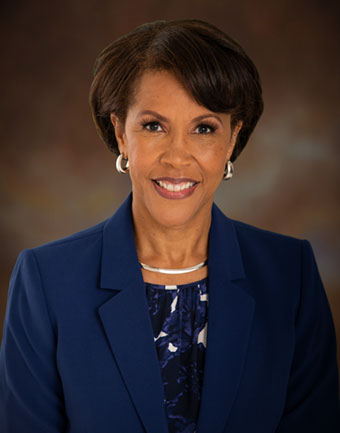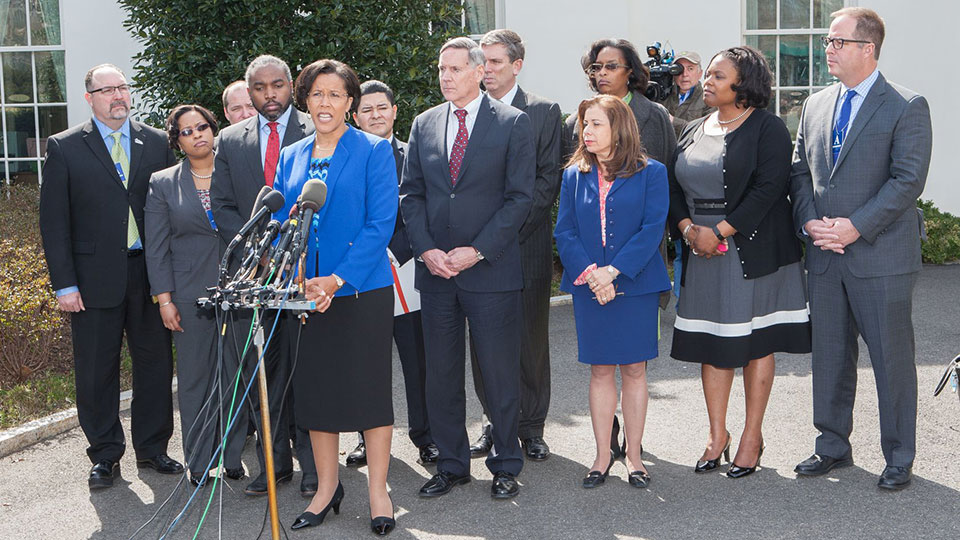Progress & Experience with A Passion for Education. Meet Orange County Public Schools Superintendent, Dr. Barbara Jenkins
 Dr. Barbara Jenkins has been dedicated to serving the needs of students for 30 years. She was named superintendent for Orange County Public Schools in 2012.
Dr. Barbara Jenkins has been dedicated to serving the needs of students for 30 years. She was named superintendent for Orange County Public Schools in 2012.
Under Dr. Jenkins' leadership, the district won the prestigious 2014 Broad Prize for Urban Education. The prize earned half-a-million dollars for student scholarships from the Eli and Edythe Broad Foundation. The district also received the Governor’s Sterling Award in 2014 and 2015 and the Sustained Excellence Award in 2017 for its exemplary performance using research-based best practices in its business. In 2016, OCPS received District Accreditation from AdvancED for its best practices in the education field. OCPS has repeatedly been recognized by the College Board for increasing access to Advanced Placement course work, while simultaneously maintaining or increasing the number of students earning exam scores for college credit. Dr. Jenkins is a recognized education leader. In January 2017, she received a presidential appointment as a director of the National Board of Education Sciences. She serves on the executive board of directors of the Council of the Great City Schools, Chiefs for Change, The Wall Street Journal CEO Council and the Florida Council of 100. She is past president of the Florida Association of District School Superintendents. In 2017, she was named the Florida Superintendent of the Year and one of four finalists for the national title. The Association of Latino Administrators and Superintendents named her Hispanic-Serving School District Superintendent of the Year and the Florida Association for Career and Technical Education named her CTE Superintendent of the Year. Recognized for her commitment and influence, both the Orlando Sentinel and Orlando Magazine have named her as one of the 10 most powerful people in Central Florida on multiple occasions; Orlando Magazine ranked her number one in Education among its 2018 "50 Most Powerful." The Orlando Business Journal honored her as a CEO of the Year in 2015. In 2014, she was named the Visionary Award recipient by the Girl Scouts of Citrus Council and the Central Florida Woman of the Year by the Women’s Executive Council. Deeply engaged in the community, Dr. Jenkins serves on the boards of United Arts of Central Florida, Orlando Economic Partnership, Florida Hospital, Central Florida Regional Commission on Homelessness and the Orange County Youth Mental Health Commission.
Q: When your career in Education started, did you have any idea, you would be where you are today?
Dr. Jenkins: No, I really loved teaching but was drawn into leadership roles over the course of my career.
Q: Tell us how you transitioned from teaching in the classroom to an administrative role?
Dr. Jenkins: My principal, Jim Kaiser saw potential in me and motivated me to take on greater responsibilities. He said things like “Don’t you want to make good things happen for more children beyond your classroom?” He moved me to team leader for my grade level and encouraged me to pursue a graduate degree to become a principal so I could influence an entire school. I completed graduate school and moved from resource teacher to school principal and then central office roles. Each transition included an expanded capability of positively impacting the lives of students.
Q: In your opinion, what are the biggest challenges that teachers face today?
Dr. Jenkins: Teachers have many challenges, including the lack of funding and respect for public education at a national and state level. Secondly, they have to deal with the growing needs of our families and community. OCPS serves 212,000 students, including those from very affluent families and 9,000 who come from a family that is homeless. Teachers must differentiate their support and instruction in the classroom to provide equity for every student. They must tend to many needs beyond the curriculum and be mindful not to miss the giftedness of a student who also happens to be homeless. Thirdly, teachers are challenged to provide for the mental health and well-being of our students. Gun violence and safety threats are very real in public schools today so teachers must accommodate active shooter drills and the emotional toll on our children. Lastly, teachers face the challenge of high stakes accountability systems that place pressure on students to perform and connect that performance to their individual pay.
Q: Can you share with our audience, some of the educational opportunities you have championed as Superintendent?
Dr. Jenkins: I have been a proponent of providing access and encouragement for larger and more diverse numbers of students to participate in more rigorous course offerings. Taking Advanced Placement courses in high school shouldn’t be tied to socio-economic status or to a child having an advocate. Research clearly points to the use of data to purposely schedule students in those classes and support their success. At the primary grades, we instituted universal screening for gifted status in order to identify more underrepresented students lacking an advocate to request testing.
Q: In your role as Superintendent, what steps can you implement to see that every child gets the opportunity to succeed and be prepared for college, career and life?
Dr. Jenkins: Our partnership with Khan Academy was groundbreaking in opening access to preparation for the SAT in order to increase college opportunities for students. We have also exponentially increased offerings and the number of students graduating with industry certifications through our Career and Technical Education programs at Orange Technical College.
Q: What’s the toughest part of your job?
Dr. Jenkins: Without question, the toughest part of the job is dealing with student discipline issues that require total removal from school. When young people make critical mistakes, they must accept the consequences, but it is often heartbreaking to witness.
Q: What will be the biggest challenge for the generation of women behind you?
Dr. Jenkins: I believe women will continue to deal with gender equity issues in the work setting. Pay equity comparisons are disheartening and will take major efforts to solve. In education, the greatest challenges will revolve around mitigating issues in society that greatly impact children, including poverty, mental health and discrimination.
Q: What’s one leadership lesson you’ve learned in your career that you can share with our audience?
Dr. Jenkins: Teamwork is critical to success, so surround yourself with great talent and learn to delegate, monitor and develop your bench.
Q: Can you offer some advice for young women that may want to pursue a career as an educator?
Dr. Jenkins: Find your passion, something you love doing so much that it doesn’t seem like work. Study your trade so that you are always knowledgeable about the latest research or trending data. When opportunity knocks, open the door…wide!

Q: What's the greatest fear you've had to overcome to get where you are today?
Dr. Jenkins: Dealing with criticism when trying to focus on what is best for children and the organization.
Q: Can you tell our audience one of your most memorable moments your career?
Dr. Jenkins: Winning the Broad Prize in 2014, which recognized our work to improve student achievement and resulted in $500,000 is student scholarships.
Q: What’s one lesson you’ve learned in your career that you can share with our audience?
Dr. Jenkins: Pray earnestly for divine direction, and when in doubt, always side with what you believe is best for children or those who are powerless.
Q: Which woman inspires you and why?
Dr. Jenkins: My mother inspires me because she went from being a housewife to a single mom and entrepreneur who successfully raised 5 children with the support of her parents. She inspired and directed each of us to become successful adults.
Q: What are some of the challenges you feel women face today?
Dr. Jenkins: Women are obviously faced with gender equity and the glass ceiling. But women also suffer from the lack of mentors and allies to help them navigate the promotion ladder. Women in leadership must commit to assisting and coaching both female and male subordinates.
Q: Tell us how you manage your work-life balance.
Dr. Jenkins: I have a wonderful husband (Harold) who has always supported me. He helps me commit to taking time away from the job, exercising and eating right. My adult children (Hillary and Harrison) also kept me grounded when they were younger and continue to do so daily.
Five Things About Superintendent Dr. Barbara Jenkins
1. If you could talk to one famous person past or present, who would it be and why?
Martin Luther King, Jr. would be my choice because I remain in awe of his intellect, his vision and his personal sacrifice.
2. What were you like as a student?
I loved learning throughout school, so I was very disciplined and dedicated to classes on most days.
3. When you were 10, what did you want to be when you grew up?
From first grade, I always wanted to be a teacher.
4. What app can’t you live without?
None!
5. Where is your dream vacation?
Israel


